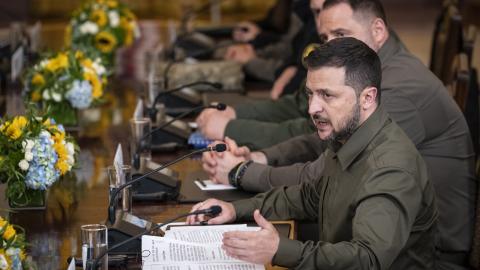Ukrainian President Volodomyr Zelensky visited the US last week for two important engagements. His first stop was New York to address the annual UN General Assembly. He then travelled to Washington to meet US President Joe Biden, Pentagon officials, and US politicians on Capitol Hill.
The timing of his visit was crucial for three reasons. First, Ukraine is in the middle of its major counteroffensive to repel Russian forces. Even though Kyiv is making advances, progress has been slower than many had hoped. Furthermore, the US has been reluctant to provide Ukraine with the long range weapons that are needed. Zelensky wants to change this.
Second, winter is fast approaching and memories of electricity and heating outages from Russian airstrikes last year are still fresh in the minds of many Ukrainians. Last week, Russia attacked Ukraine’s electrical power grid for the first time in months, leaving thousands without electricity. This was a reminder of how difficult last winter was and foreshadowed how challenging the coming winter might be. After long-range missiles, Zelensky will be asking for more air defense systems.
Finally, Congress will soon be voting on whether to give Ukraine more military and financial support. Additional aid will be crucial heading into the winter months, but some politicians are growing skeptical of sending more aid to Ukraine. Zelensky will be in Washington trying to convince them otherwise.
This year the president addressed the General Assembly in person, having spoken virtually last year. Muchof his speech focused on nuclear threats by Moscow. He told the audience: “Look what Russia did to our Zaporizhzhia power plant — shelled it, occupied it and now blackmails others with radiation leaks.”
With the eyes of the world watching, he also took the opportunity to address the breakdown of the Black Sea Grain Initiative. This deal was brokered by Türkiye last year to allow much needed Ukrainian grain to be shipped to countries across Africa, the Middle East and China. Until this agreement, Russia was preventing grain ships from leaving Ukrainian ports. For almost a year Ukrainian grain was exported without any threats from the Russian Navy. Since July, Russia has suspended its participation in the initiative leaving global food security in doubt.
After New York, President Zelensky headed south to make the case to policymakers in Washington for more aid for Ukraine. This was no easy task.
An increasing number of Republicans oppose additional support for Ukraine. They are joined by some Democrats who are also growing weary of continued military aid — especially after the Biden administration’s decision this year to provide cluster munitions to Ukraine. This has created an unusual dynamic in American politics in which politicians on the far-right and far-left are now aligning with one another against more support for Ukraine.
Zelensky spent hours meeting members of Congress. He also received military briefings at the Pentagon and met Biden at the White House. He concluded his visit with a major speech at the National Archives Building. Throughout his visit there was one clear message: The sooner Ukraine gets the weapons it needs, the sooner the war will end.
It is too early to tell if Zelensky’s visit to Washington will have an impact on skeptical politicians. However, there is a strong case to be made for the US to continue its military support for Ukraine.
Despite what some in Congress argue, the US can easily afford to continue current levels of support. Over the past 19 months, American assistance to Ukraine has amounted to only about 0.04 percent of GDP. If the political will is found, this is easily affordable. American taxpayers have received a great return in investment too. Ukraine has been dismantling the armed forces of Russia — one of America’s top geopolitical adversaries — for pennies on the dollar. It is also likely that Ukraine’s stiff resistance against Russia’s invasion has played a key role in deterring any aggression against Taiwan.
Some politicians use the excuse that Europeans are not doing enough for Ukraine,to argue that the US should do less. This is no longer true. Collectively, Europeans have now committed more money than the USto help Ukraine. As a percentage of GDP, the US ranks behind 20 European countries in terms of aid.
Some in the US argue that more military aid delays peace talks and prolongs the war. This is easy to say sitting comfortably thousands of kilometers away from the frontlines. The Ukrainians are fighting for their national survival. If Russia stops its military operations, the war ends immediately. If Ukrainians stop fighting, their nation could disappear. The Kremlin has not shown any sign of wanting a negotiated peace. On the contrary, Moscow just launched another wave of recruitment to send fresh troops to Ukraine. If American politicians want the war to end quickly, then they should provide Ukraine with what it needs to win, and not just enough aid to merely survive.
As America enters a presidential election campaign, it will be tempting for some to bring politics into the debate about US support for Ukraine. That would be a mistake. Cutting off US military assistance to Ukraine doesn’t hurt Biden. It hurts only Ukrainians.
Zelenskyy delivered a strong message during his visit to the US. It remains to be seen if this message was heard. For the sake of Ukraine, let’s hope that it was.

















